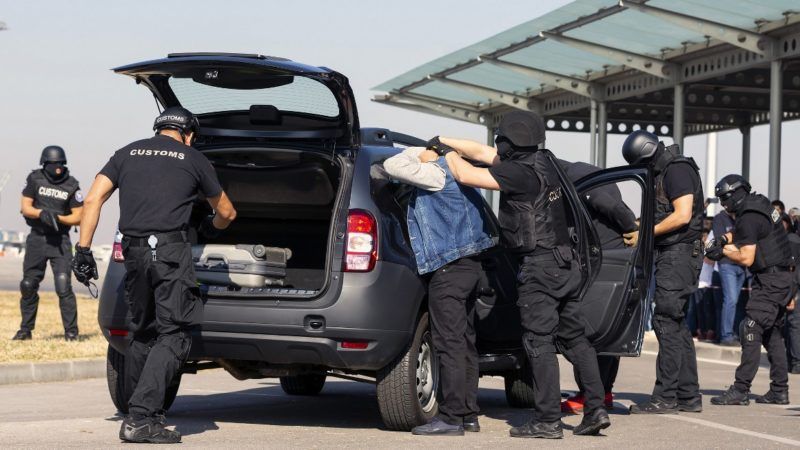A New Bill Would Stop the Feds From Tossing Drug Defendants in Prison Before They're Convicted
A proposed bipartisan change in pretrial detention rules could free thousands annually.

A bipartisan trio of senators has introduced a bill that could potentially keep people charged with federal drug crimes out of unnecessary pretrial detention. Sens. Dick Durbin (D–Ill.), Mike Lee (R–Utah), and Chris Coons (D–Del.) have introduced the Smarter Pretrial Detention for Drug Charges Act of 2020.
Currently, if you're arrested for federal drug charges, a judge will determine your release conditions on the presumption that you will be let free, unless the judge concludes you're a danger to the community or a flight risk. This, logically, is how pretrial detention should be handled in accordance with the Fifth Amendment of the Constitution. People who are suspected of crimes, but not yet convicted, shouldn't be treated as guilty and imprisoned solely on the basis of unproven suspicion.
However, if you face a federal drug charge with a potential sentence of more than 10 years, the judge is required to treat you with the presumption that you will be detained, just as if you'd a serious violent federal offense and even if no violence was involved in your drug case. As a result, Durbin's office noted, defendants charged with drug crimes end up being stuck in jail in two-thirds of federal cases. The average defendant will spend 255 days in pretrial detention without having been convicted of a crime.
Durbin, Lee, and Coons' bill will put all drug offenses on the same level. People charged with drug offenses that could potentially result in long prison sentences will no longer be treated with a presumption or pre-trial detention. But this is also not a "Get Out of Jail Free" pass. A judge can still order the confinement of a defendant who is deemed a threat to the community or a flight risk. The difference is that the courts will no longer presume that this threat exists without any evidence.
"The Fifth Amendment protects the life, liberty, and property of all Americans from government interference without due process of law. This legislation seeks to better protect the right of all Americans against unjust imprisonment by changing the presumption for pretrial detention," said Lee in a prepared statement. "This change to a presumption against pretrial detention will allow judges more discretion to consider each defendant's individual and unique circumstances when deciding whether pretrial detention is appropriate and necessary."
The bill has the support of criminal justice reform groups across the political spectrum. The American Civil Liberties Union, the Innocence Project, and the Drug Policy Alliance all support it, as does Americans for Prosperity, Justice Action Network, Americans for Tax Reform (federal pretrial detention costs taxpayers $18,615 per defendant), and FreedomWorks.
"At a time when pretrial detention is at a record high, COVID-19 continues to spread rapidly through our prisons and jails—creating a deadly situation where incarcerated people are twice as likely to die from this deadly pandemic," Holly Harris, president and executive director of Justice Action Network, said in a statement. "Our criminal justice system was in desperate need of reform well before COVID-19 hit, but it is now in a state of emergency. We urge members of Congress from both sides of the aisle to support this legislation and ensure that we take smart steps to reduce incarceration and save the lives of people in prisons, correctional workers, and our communities at large."
So far there have been 13,139 reported COVID-19 infections in federal prisons and 125 deaths. There are currently about 226,000 people in federal detention, either convicted of crimes, awaiting trial, or being held over immigration issues.
How many people will Durbin, Lee, and Coons' bill actually help? Probably not a huge number when compared to the entire population of people being held in prisons and jails in America. According to data from the Prison Policy Initiative, only about 22,000 people are being held in pre-trial detention in federal jails for drug crimes, but nearly half a million people being held in pretrial detention in state and local jails. The percentage of imprisoned people who may be freed under these new rules is in the single digits.
But the possibility that this law helps only a couple of thousand people per year doesn't make this bill bad or worthy of dismissal. The FIRST STEP Act proves that criminal justice reforms can have huge, positive impacts on the lives of federal inmates, even if only a small number of the total prison population reaps its benefits.
Rather, the reason it's worth noting the small number of people this bill will help is to illustrate that comprehensive criminal justice reform does not result from a single bill, or five, or 10. Given that most people are imprisoned by the states, not the federal government, reform will continue to require a wide network of activism and supportive lawmakers across the country, and many, many changes to laws and policies.
The Smarter Pretrial Detention for Drug Charges Act of 2020 is just a small part of these reforms, but it will certainly mean a lot for several thousand people each year if it passes.
